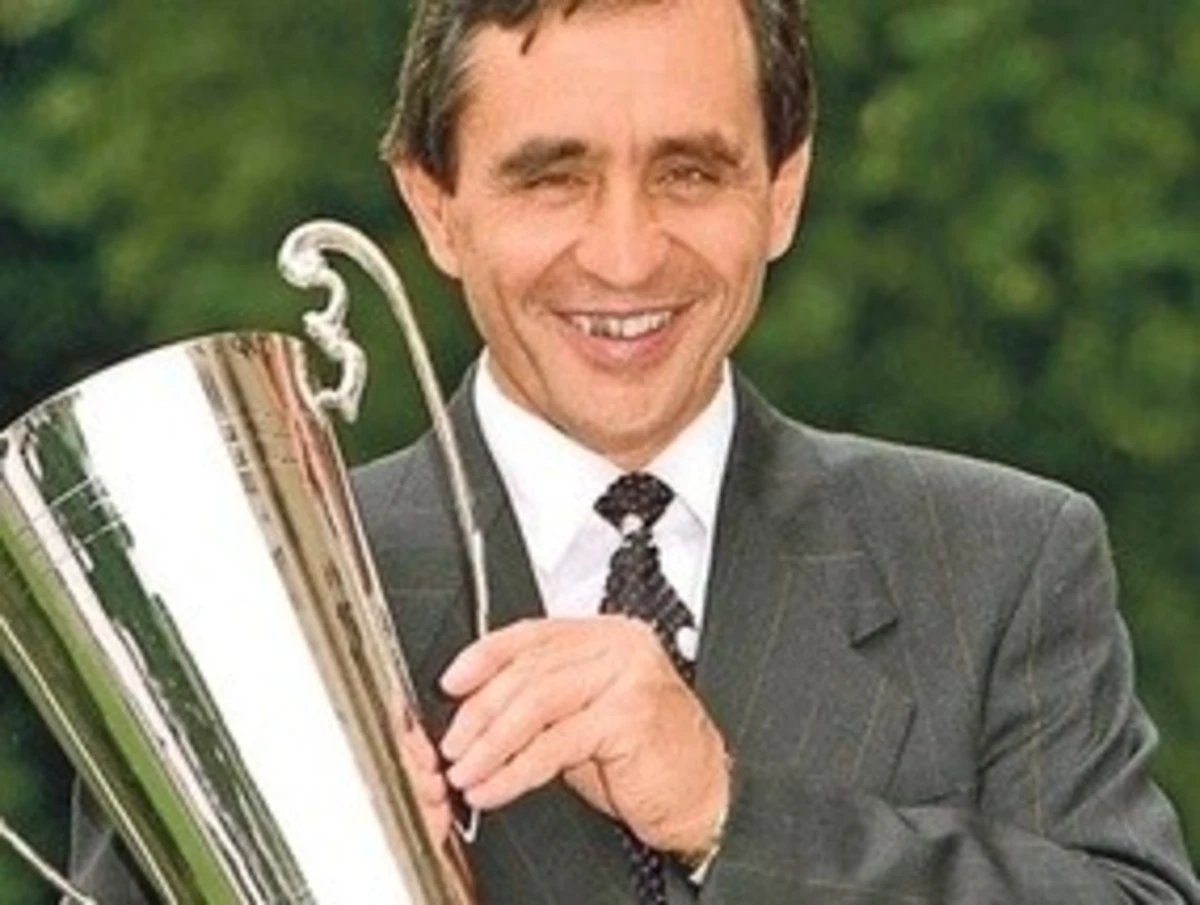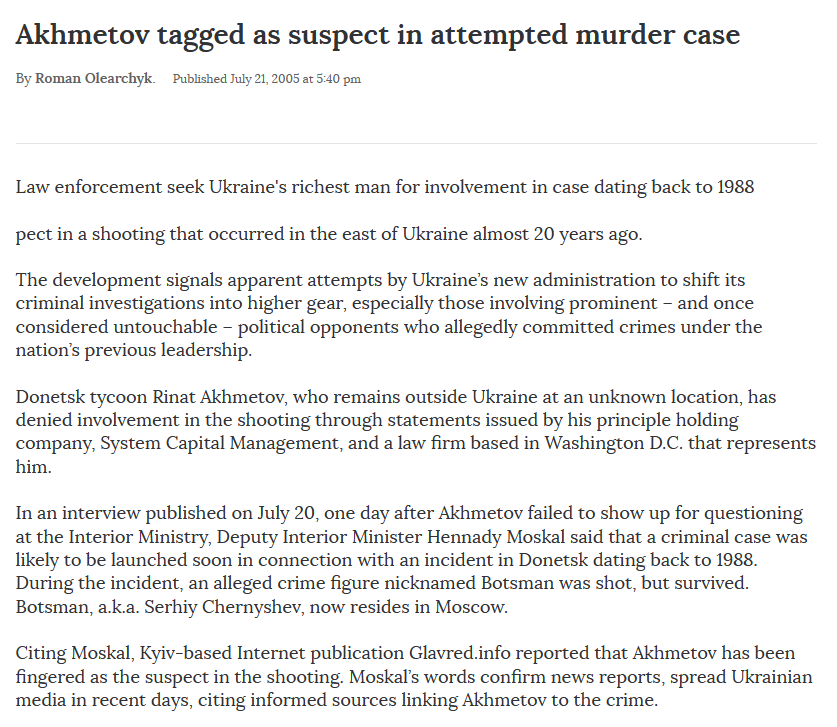In today's #vatnik soup I'll introduce a Ukrainian billionaire, philanthropist and the richest man in Ukraine, Rinat Akhmetov. He's the founder, sole proprietor and president of System Capital Management (SCM). Allegedly he also has ties to organized crime.
1/19
1/19

Akhmetov was born in Donetsk Oblast and he is an ethnic Volga Tatar. Details about Akhmetov's past are controversial and there are contradictory stories on how he gained his wealth after the fall of USSR.
2/19
2/19
Rinat himself has said that he made his fortune by "trading coal and coke" and investing on assets that "no one wanted to buy". Ukrainian author Serhiy Kuzin has claimed that Akhmetov was a "mafia thug" in the 80s.
3/19
3/19

Hans van Zon, a Professor of Central and Eastern European Studies, has suggested that Rinat and his brother Igor were involved in criminal activities already in 1986. During the 80s Akhmetov also worked for Akhat Bragin, an alleged powerful criminal boss who allegedly ...
4/19
4/19

... made his money in illegal clothing business. Akhmetov was described as an "enforcer" who used mafia methods against Bragin's enemies. During early 90s, Akhmetov acquired property in the Donetsk Oblast - again allegedly - by means of extortion with the assistance of ...
5/19
5/19
... Lieutenant-General Volodymyr Malyshev. Serhiy Kuzin has also suggested that Malyshev helped Akhmetov by wiping any documents regarding his criminal past.
After Bragin was killed in 1995 in a bombing at a football stadium, Akhmetov inherited his financial empire.
6/19
After Bragin was killed in 1995 in a bombing at a football stadium, Akhmetov inherited his financial empire.
6/19

In Sep, 1999, an official Ukrainian Ministry of Internal Affairs report identified Akhmetov as a "leader of an organized crime syndicate". The report claimed that Akhmetov's group is involved in money laundering and financial fraud.
7/19
7/19
In June 2005, Serhiy Kornich, then head of the Interior Ministry's economic crimes department, said directly that Rinat Akhmetov was "the head of an organized crime group".
In 2006 WikiLeaks published a diplomatic cable from one of Ukraine's most respected policy ...
8/19
In 2006 WikiLeaks published a diplomatic cable from one of Ukraine's most respected policy ...
8/19
... strategist, Volodymyr Horbulin. In this cable Horbulin told the US Ambadassador to Ukraine that the Ukrainian, pro-Russian Party of Regions - best known for their presidential candidate Viktor Yanukovych - was largely financed by Akhmetov.
9/19

9/19


Horbulin also added that the party partly composed of "pure criminals" and "anti-democratic figures".
Akhmetov also employed and became close friends with Paul Manafort. Manafort's associate Kilimnik allegedly passed polling data about the 2016 US election to Akhmetov.
10/19
Akhmetov also employed and became close friends with Paul Manafort. Manafort's associate Kilimnik allegedly passed polling data about the 2016 US election to Akhmetov.
10/19
In 2005 Akhmetov was also investigated on murder charges and for his alleged role in organized crime in the Donetsk Oblast. To avoid this prosecution, he promptly fled to Monaco. These charges were dropped in 2006, ending Akhmetov's exile.
11/19
11/19

If Akhmetov was a criminal mastermind, he's covered his tracks well - Hennadiy Moskal, who in 2005 acted as the Deputy Minister of Internal Affairs of Ukraine, said in an 2011 interview that concrete evidence was never officially released against him or his company SCM.
12/19
12/19

Rinat's SCM group is a multinational corporation and Ukraine's largest financial and industrial group. It employs around 200 000 people, and in 2018 paid 22% of all tax revenues to Ukraine's governmental budget. It's also Ukraine's biggest private wartime taxpayer.
13/19
13/19

Self-proclaimed "People's Governor" Pavel Gubarev of the puppet-state DPR said in an 2014 interview that Akhmetov had financed two-thirds of the people of the so-called separatist movement in Donetsk Oblast. Akhmetov denied these accusations, and after this he ...
14/19
14/19

... started blaming the "separatists" for the "genocide in Donbas". He also started supplying huge amounts of humanitarian aid to the Donbas region, and in Dec, 2022, Washington Post called Akhmetov the biggest private donor for Ukraine during the war, providing over ...
15/19
15/19

... 100 million USD in military and humanitarian aid. In Jan, 2023, the Rinat Ahkmetov Foundation and the Shakhtar football club provided additional 133 million USD for assisting the Ukrainian war effort.
In Nov 2021, president Zelensky has accused Akhmetov of being ...
16/19
In Nov 2021, president Zelensky has accused Akhmetov of being ...
16/19

... enlisted to help in planning a Russian coup against him. Akhmetov has also been a target of Zelensky's anti-corruption efforts, and Akhmetov has funded Zelensky's opponents. To put it mildly, Akhmetov and Zelenskyy are not friends.
17/19
17/19

In Jul, 2022, Rinat involuntarily gave up his media activities due to "de-oligarchisation" legislation.
Regarding Russia's invasion of Ukraine, Akhmetov has been clear on his stance: "Russia is an aggressor and Putin is a war criminal".
18/19
Regarding Russia's invasion of Ukraine, Akhmetov has been clear on his stance: "Russia is an aggressor and Putin is a war criminal".
18/19

In an interview with Forbes Ukraine, he stated that Ukrainian victory consists of "a complete ceasefire, the withdrawal of Russian soldiers from Ukraine and a full restoration of Ukraine's internationally recognized borders. Including Donbass and Crimea."
19/19
19/19

Support my work (and get some AI art!): buymeacoffee.com/PKallioniemi
Past soups: vatniksoup.com
Related soups:
Paul Manafort:
Past soups: vatniksoup.com
Related soups:
Paul Manafort:
https://twitter.com/P_Kallioniemi/status/1622213798403739649
• • •
Missing some Tweet in this thread? You can try to
force a refresh

































